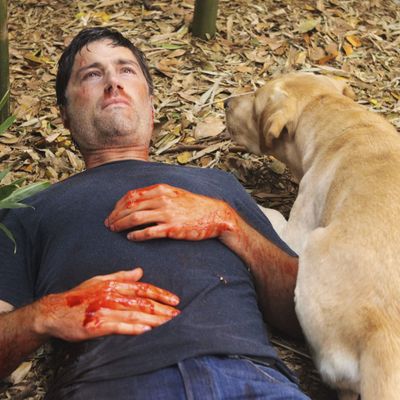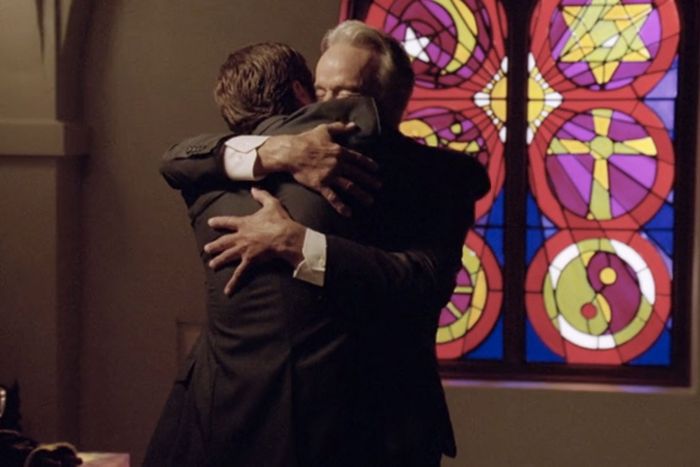
Tomorrow marks the tenth anniversary of the Lost series finale. Ask someone what they think about that episode, a nearly two-hour epic called “The End,” and even if they haven’t seen it, they will probably say it was a disappointment. To some fans and critics, “The End” didn’t offer enough answers about the show’s mysterious island and mythology, and a decade’s worth of pop-culture pot shots have cemented that reputation. But the truth is that the reaction to the finale was much more mixed than its reputation suggests. Many people, myself included, appreciated the emotional way it wrapped up Lost’s story. If you go back and rewatch “The End” now, you may be surprised to learn you appreciate it too, especially if the one and only time you watched it was on the night of May 23, 2010.
I recently did that, and in connection with another story I’m writing, I convinced Lost showrunners and co-creators Damon Lindelof and Carlton Cuse to rewatch it as well. It was the first time either of them had seen “The End” since it first aired, and it brought back what Cuse described as “a jumble of emotions.” He recalled parts of the finale as though he had just done it yesterday, while other moments he had completely forgotten. “I was a little, kind of, out of time,” he said.
That idea — “I was a little, kind of, out of time” — reflects a lot about Lost, its finale, and why it’s still so resonant despite its reputation. With an island that was seemingly untethered from time and space, and all the time-hopping the series did, Lost itself often told a story that was out of time.
“The End” unfolds, like so many Lost episodes, on two parallel narrative tracks. One takes place on the island, where some survivors of Oceanic Flight 815 are attempting to get back home, while Jack Shepherd (Matthew Fox) is trying to save the island from being destroyed by the Man in Black, who has taken over the body of the late John Locke (Terry O’Quinn). The other storyline is set in what is dubbed the “flash sideways,” an alternate timeline where Oceanic 815 never crashed on the island and we’re able to see how the lives of its passengers might have turned out if they’d never met the Others or learned about the Dharma Initiative. There, in the finale, Desmond (Henry Ian Cusick) and Hurley (Jorge Garcia) help all the principal Lost characters reconnect and convene in a church, where Jack, with the help of his father, Christian (John Terry), realizes he died on the island and moves on to the next spiritual plane.
Both Cuse and Lindelof are still very proud of “The End,” but, as all artists do when looking back at their past work, appreciated certain parts more than others. “I actually think that if we didn’t have that damn stained glass window that we would’ve gotten a full letter grade higher on the finale,” said Lindelof, referring to a window in the church that features symbols from several major religions.
They were especially moved by the events that take place in the flash-sideways, where, one by one, each major character is suddenly awakened to memories of the island, often when someone who also had been there touches them. “I got emotional watching that stuff because it felt like the characters were in a Lost reunion show that they didn’t know they were in,” Lindelof said. “It was like The Truman Show. It was like, ‘Oh, Jack, you were actually on this show called Lost where you had all these adventures on an island.’”
Those moments, in which physical contact sparks recollection of a life left behind, got me choked up for a similar reason. I was watching the characters flash back to their island existences, while I also was flashing back to my experience years ago of watching them live on the island for six seasons. But I got choked up for another reason, too: Aren’t we, at this moment, also living a little out of time? In the third month of quarantining, when we can barely recall what it felt like to live normal, unrestrained, mask-free lives, those scenes packed a whole different punch. I imagine that when we’re allowed to hug our friends again, the flood of what pre-pandemic life felt like will come rushing back, the same way island life did for Locke, Kate, Sun, Jin, Sawyer, Juliet, and all of the rest. It hurts to think about that because we’re still not there yet.
“I felt that the thematic intentions of nobody doing it alone — you need them and they need you — a lot of the emotionality of the themes was very poignant in this particular moment, when we’re all separated from each other by a pandemic,” Cuse said.
An idea that Lost returned to, again and again, was that credo Jack loved to repeat: “Live together, die alone.” One of the main messages of the series, echoed in “The End,” is that no one does anything by themselves. Jack saves the island by killing the Man in Black and then pushing that huge, ancient cork back into the drain in the heart of the island. (Okay, it’s fine if you still think that part is weird.) But he couldn’t have done that without the help of Desmond, Hurley, and, weirdly enough, his former foe Benjamin Linus. Jack technically dies alone in the forest, albeit with Vincent the lab by his side. But he also doesn’t, because if one understands the flash sideways to be a world that, as his father Christian explains it, Jack and the Oceanic survivors made together, then in his final moments of consciousness, Jack is with all of his friends.
“No one does it alone, Jack,” Christian tells his boy. “You needed all of them. And they needed you.” In the end, Lost, above all other things, was about how crucial it is to love and have the backs of your fellow humans. I can’t think of a time where those words have been more applicable than right now, when we can’t beat a virus unless we’re all willing to put each other’s safety before our selfish, petty desires.
That’s why watching “The End” again recently was such a cathartic and moving experience. I didn’t just tear up when I watched it again; I full-on sobbed. Maybe it’s because that line that Christian Shepard says to Jack — “There is no now here” — encapsulates how it feels to be alive right now. We never know what day it is. When we’re not watching old TV shows and movies or setting up video chats with friends we haven’t seen in years, we’re cleaning out our closets and attics, immersing ourselves in mementos and old photographs that transport us to 1985, or 1999, or 2010, when we hosted that amazing Lost finale watch party and served all our guests homemade Dharma fish biscuits. There is no now, here, as we once understood it.
Maybe I sobbed because the sight of Vincent the lab and the sound of Michael Giacchino’s music can make me cry in any context. Or maybe it’s because Lost is more than just a show to me. It’s a trigger that reminds me of my mother, who loved Lost so very much and died two years after it ended; and of the nights I spent puzzling over Lost theories while rocking my then-infant son to sleep; and of the world it opened to me as a writer at the Washington Post, where my colleague and friend Liz Kelly Nelson recapped each episode every week. I would not be a TV critic now if it weren’t for Lost then.
What I do know is that the out-of-timeness that Cuse mentioned is one of the reasons that Lost, “The End” included, still endures. It may be ten years gone, but its themes and messages are timeless. It’s very possible that people who didn’t like the finale may rewatch it now and find they are just as irked as they were then. You don’t, to borrow Jack Shephard’s famous words from the season three finale, have to go back. But you might find that if you do, you’ll see something different than you did a decade ago.



